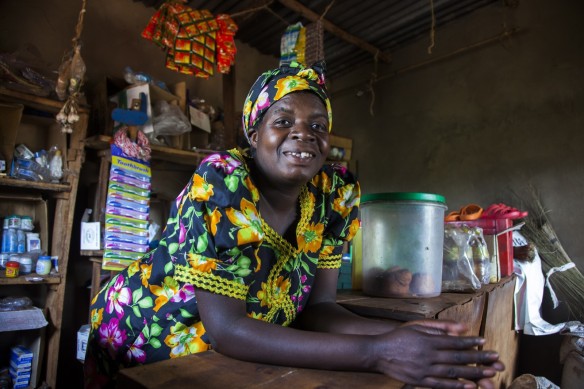
Meet Rahabu, the shop owner from Nyarubuye
Five years ago, Rahabu Mukampenda couldn’t get credit. Today, she provides it. And to think it’s all down to a few simple skills she learned at a Village Savings and Loans Group.
Tomato catch-up
Stop by Rahabu’s bustling shop in Burembo village, Rwanda and there’s a few things you’ll quickly notice. First, the variety of stock. The 44-year-old started out in 2010 with a crop of tomatoes she’d grown herself, having noted their popularity in nearby markets, but today her bestsellers range from cooking oil to body lotion, each chosen to satisfy customer demand.
Second is the abundance of customers. There are two nearby shops in Rahuba’s corner of Nyarubuye district, Eastern Province, but neither is as conveniently located. As a result she nets 20,000 Rwandan Francs (US $30) a month.
A long way travelled, a longer way to go
The human cost of Rwanda’s genocide is well-known, if inconceivable: over the course of 100 days in 1994 an estimated 800,000 were killed, literally decimating the country’s population. The economic cost is underreported, if staggering: in ’94 alone, growth dropped by 50 percent while inflation rose to 64 percent. The plunge helps explain how, despite high growth rates and decreasing poverty, the country remains one where almost 80 percent of the population is involved in farming, most at the subsistence level.
Rahabu was one of them. Back in 2009, before she joined a Village Savings and Loans Group organised by Hand in Hand Eastern Africa field partner CARE Rwanda, the mother of seven daughters aged 6 to 23 tended a small patch of land for 12 hours a day, growing just enough for the family to eat once daily. Soap, new clothes and secondary school fees were out of the question.
 When she first joined the group, Rahabu worked for others to earn the 400 RWF (US $0.60) in required weekly savings. Discipline came easy. “You sometimes go to market to buy beans but when you are there you see something else that you would like and so you spend more than you meant to,” she said. “Because of the training I learned to buy what I need and save the rest.”
When she first joined the group, Rahabu worked for others to earn the 400 RWF (US $0.60) in required weekly savings. Discipline came easy. “You sometimes go to market to buy beans but when you are there you see something else that you would like and so you spend more than you meant to,” she said. “Because of the training I learned to buy what I need and save the rest.”
Having learned how to save, Rahabu soon graduated to learning basic financial and marketing skills. Now she’ll hold on to stock until prices rise, or extend credit to customers who can’t afford the essentials.
The dish
Back at home, things have changed immeasurably. Rahabu didn’t just buy dishes – she bought cupboards to store them. She even bought a modern stove. Even better, she says, her four youngest children will attend secondary school – a first in the family. With success like that, Rahubu’s husband Mutabagisha has been happy to take over the family farm. And Rahabu? She’s busy puzzling over her next move: how to expand her business.
Rahabu’s results
In 2013, Hand in Hand Eastern Africa and CARE Rwanda co-operated to empower some 100,000 Rwandans, mostly women, to work their way out of poverty by running their own sustainable businesses. The three-year, US $3.2 million partnership was grounded in our shared belief in the power of entrepreneurship to fight poverty.
Next case study: Meet Gloria, the former refugee growing crops – and profits
